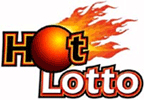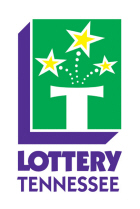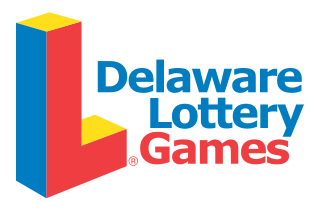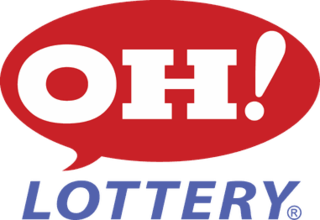In the United States, lotteries are run by 48 jurisdictions: 45 states plus the District of Columbia, Puerto Rico, and the U.S. Virgin Islands.

Mega Millions is an American multijurisdictional lottery game; as of June 30, 2023, it is offered in 45 states, the District of Columbia, and the U.S. Virgin Islands. The first Mega Millions drawing was in 2002. What is now Mega Millions initially was offered in six states; the logo for all versions of the game following the retirement of The Big Game name featured a gold-colored ball with six stars to represent the game's initial membership, although some lotteries insert their respective logos in the ball.
Powerball is an American lottery game offered by 45 states, the District of Columbia, Puerto Rico and the U.S. Virgin Islands. It is overseen by the Multi-State Lottery Association (MUSL), which also manages other large jackpot games such as the Mega Millions. From 1992 to 2021, Powerball drawings were held biweekly on Wednesdays and Saturdays. Monday drawings were added to help boost sales and increase jackpot amounts. Powerball drawings are held at 10:59p.m. Eastern Time, at the Florida Lottery's headquarters in Tallahassee.

Hot Lotto was a multi-state lottery game administered by the Iowa-based Multi-State Lottery Association (MUSL), which is best known for operating the Mega Millions and Powerball games.
Tri-State Lottery is the terminal-generated game series offered by the Maine, New Hampshire, and/or Vermont lotteries. It was the first multi-jurisdictional lottery. Its first multi-state game came in September 1985. The compact includes five games: Megabucks ; Pick 3 and Pick 4, Gimme 5, and Fast Play ; the latter are games that differ among the three states.
The Oklahoma Lottery is an American lottery that is operated by that state's government. The Lottery, which began ticket sales on October 12, 2005, is a member of the Multi-State Lottery Association (MUSL).
The Iowa Lottery Authority is run by the state of Iowa. It is a member of the Multi-State Lottery Association (MUSL), which administers games on behalf of the member lotteries. The Iowa Lottery portfolio includes Powerball, Mega Millions, Lotto America, Lucky for Life, Pick 3, Pick 4, plus numerous instant scratch ticket, InstaPlay and pull-tab games.
The Maine Lottery is run by the government of Maine. It is a member of the Multi-State Lottery Association (MUSL), whose flagship game is Powerball. It was founded in 1974 after being approved through a voter referendum.
The New Hampshire Lottery was established in 1964, making it the third-oldest lottery in the United States, and the oldest in the contiguous United States. New Hampshire's lottery games include Lucky for Life, Mega Millions, Powerball, Tri-State Megabucks Plus, and numerous scratch tickets. All New Hampshire Lottery games require players to be at least 18 years old.

The Idaho Lottery began play on July 19, 1989, and is run by the government of the state of Idaho. It is a member of the Multi-State Lottery Association (MUSL). Fifty percent of all net funds is given to public schools, while the remainder is pledged to the Permanent Building Fund, which is used as a financial resource for the state's colleges and universities.
The North Dakota Lottery is run by the government of North Dakota. The Lottery began in 2004, following voter approval of an initiative constitutional amendment in 2002, Measure 2, which amended Article XI, Section 25 of the North Dakota Constitution to allow for the state to join a multi-state lottery "for the benefit of the State of North Dakota." In-state games were not allowed; 63 percent of voters supported the measure.
The South Dakota Lottery is run by the government of South Dakota. It is a member of the Multi-State Lottery Association (MUSL). The Lottery is headquartered in Pierre; it is a self-funded endeavor. The minimum age to buy tickets is 18; however, video lottery players must be at least 21.
The West Virginia Lottery is run by the government of West Virginia. It was established in 1984 via a voter referendum. It is a charter member of the Multi-State Lottery Association (MUSL). The Lottery offers games such as Lotto America, Powerball, Mega Millions, and scratch tickets. West Virginia has reinterpreted the amendment to its Constitution that permitted its lottery to include casinos, and thus the West Virginia Lottery Commission also regulates slot machines, which are marketed as "video lottery" and available at several hundred businesses; and five "lottery table games" casinos.

The Tennessee Lottery is run by the Tennessee Education Lottery Corporation (TELC), which was created on June 11, 2003, by the Tennessee General Assembly. TELC derives its legal authority from the Tennessee Education Lottery Implementation Law, which the General Assembly passed following a November 2002 amendment to the state constitution establishing the lottery and approved by 58 percent of the voters.
The Arizona Lottery is a state agency of Arizona in the southwest United States. It is a member of the Multi-State Lottery Association (MUSL). Lottery draw games include Mega Millions, Powerball, The Pick, Triple TwistFantasy 5, and Pick 3. A variety of instant scratch tickets, or Scratchers, are also offered.

The Delaware Lottery is run by the government of Delaware. Its creation was authorized by the state legislature on May 31, 1974. Its "traditional" games include Play 3, Play 4, Multi-Win Lotto, Lucky For Life, Lotto America, Mega Millions, and Powerball. Delaware also offers Keno, sports betting, and video lottery.

The Hoosier Lottery is the official state lottery of Indiana, and is the only US lottery that uses the state's nickname as its official name. It is a member of the Multi-State Lottery Association (MUSL). The Hoosier Lottery sells scratch-off tickets; its draw games include Mega Millions, Hoosier Lotto, Powerball, Cash 5, and Poker Lotto.

The Ohio Lottery is a state lottery run by the Ohio Lottery Commission. Its games consist of scratch tickets; Pick 3, Pick 4, Pick 5 ; Rolling Cash 5, Classic Lotto, Keno, Lucky for Life, Mega Millions, and Powerball.

The Colorado Lottery is run by the state government of Colorado. It is a member of the Multi-State Lottery Association(MUSL).

Lotto America is an American multi-state lottery game that began in 2017. It is operated by the Multi-State Lottery Association (MUSL). It takes its name from the original Lotto America, offered from 1988 to 1992. Lotto America was re-launched by 13 state lotteries on November 12, 2017, as a replacement for the scandal-tarred Hot Lotto game; each of the 13 members of Lotto America offered Hot Lotto when it ended on October 28, 2017.








